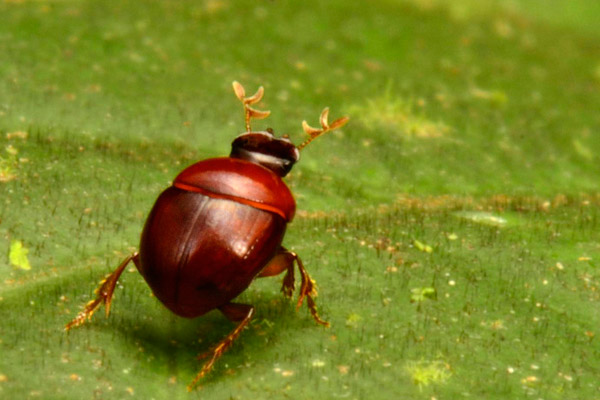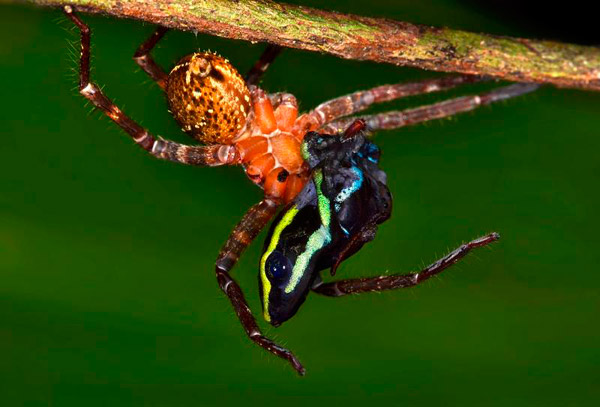Welcome to DU!
The truly grassroots left-of-center political community where regular people, not algorithms, drive the discussions and set the standards.
Join the community:
Create a free account
Support DU (and get rid of ads!):
Become a Star Member
Latest Breaking News
General Discussion
The DU Lounge
All Forums
Issue Forums
Culture Forums
Alliance Forums
Region Forums
Support Forums
Help & Search
Environment & Energy
Related: About this forumScientists Find 60+ Previously Unknown Species In Surinam, Including Cocoa Frog, Beetles, More

Scientists believe the so-called 'cocoa' frog is new to science. Photo by: Conservation International.
In one of the most untouched and remote rainforests in the world, scientists have discovered some sixty new species, including a chocolate-colored frog and a super-mini dung beetle. The species were uncovered in Southeastern Suriname during a Rapid Assessment Program (RAP); run by Conservation International (CI), RAPS involve sending teams of specialists into little-known ecosystems to record as much biodiversity as they can in a short time. In this case, sixteen researchers from around the world had about three weeks to document the region's biodiversity.
"Suriname is one of the last places where an opportunity still exists to conserve massive tracts of untouched forest and pristine rivers where biodiversity is thriving," says Trond Larsen, the Director of the Rapid Assessment Program at Conservation International. "Ensuring the preservation of these ecosystems is not only vital for the Surinamese people, but may help the world to meet its growing demand for food and water as well as reducing the impacts of climate change."
The biologists visited four sites along the upper Palumeu River watershed, including mountains to lowlands. They catalogued 1,378 species in total (an average of 86 per researcher), of which about sixty are thought new to science.
Suriname is one of the most-heavily forested countries in the world: around 91 percent of the country is still covered in forest according the FAO, while the small country's population remains small. However, mining, hydropower, and other industries are beginning to take their toll. In fact, the team measured high levels of mercury in the river despite being far from mining sites, but Larsen says the mercury is likely coming from mining and energy operations in other countries.
EDIT

The 'lilliputian beetle' may not only be a new species, but a new genus. It is the smallest dung beetle yet discovered in the Guiana Shield, and the second smallest in all of South America. Dung beetles are nature's recyclers, mitigating disease and turning over nutrients. Photo by: Conservation International.

This new katydid is distinct enough to make its own genus. Note its unusually long legs. Photo by: Conservation International.

Scientists were able to capture what they call a 'very rare event': a wolf spider eating a poison dart-frog (Amereega trivitatta). Photo by: Conservation International.
http://news.mongabay.com/2013/1011-hance-suriname-raps.html
But enough of this squishy biophilic nonsense! Let the overflights, the mining, dams, logging and construction proceed, let meth and hookers and whiskey flow, let cars, roads and shoddy housing beget themselves, so that Holy, Sacred Money may be extracted!
InfoView thread info, including edit history
TrashPut this thread in your Trash Can (My DU » Trash Can)
BookmarkAdd this thread to your Bookmarks (My DU » Bookmarks)
2 replies, 3322 views
ShareGet links to this post and/or share on social media
AlertAlert this post for a rule violation
PowersThere are no powers you can use on this post
EditCannot edit other people's posts
ReplyReply to this post
EditCannot edit other people's posts
Rec (6)
ReplyReply to this post
2 replies
 = new reply since forum marked as read
Highlight:
NoneDon't highlight anything
5 newestHighlight 5 most recent replies
= new reply since forum marked as read
Highlight:
NoneDon't highlight anything
5 newestHighlight 5 most recent replies
Scientists Find 60+ Previously Unknown Species In Surinam, Including Cocoa Frog, Beetles, More (Original Post)
hatrack
Oct 2013
OP
stuntcat
(12,022 posts)1. And we will CRUSH them.
On our world this is like sifting through a giant ruin and finding a beautiful colorful picture and then burning it.
Maybe that seems dramatic to say but unless our "society" collapses soon this will all be trashed by the end of the century.
pscot
(21,024 posts)2. Yeah, but at least we noticed them
before we destroyed them. I'm sure there's some consolation to be found there.